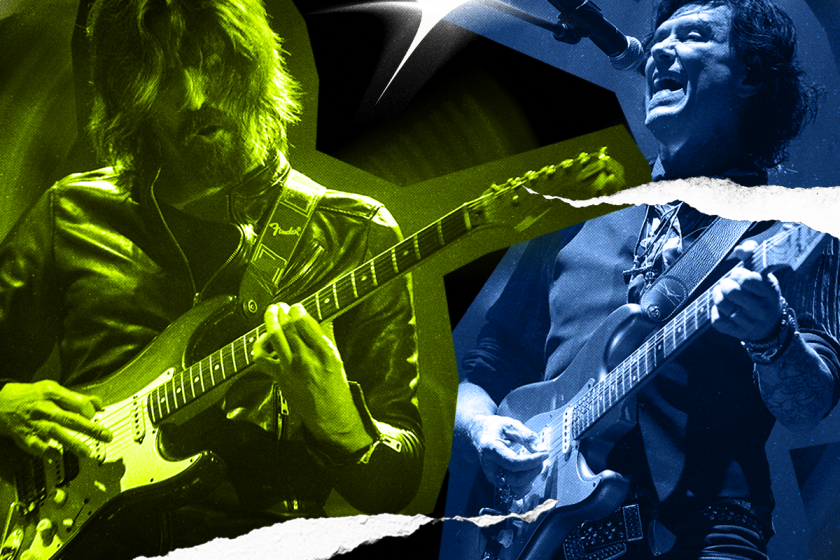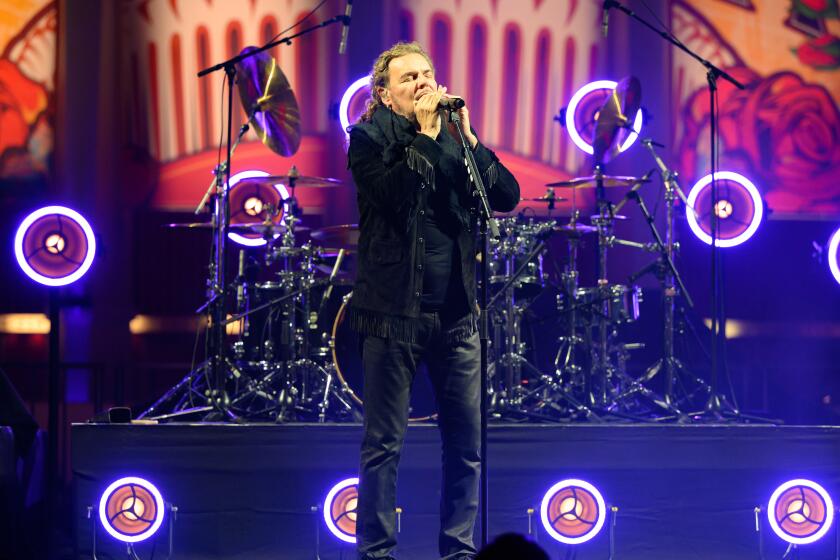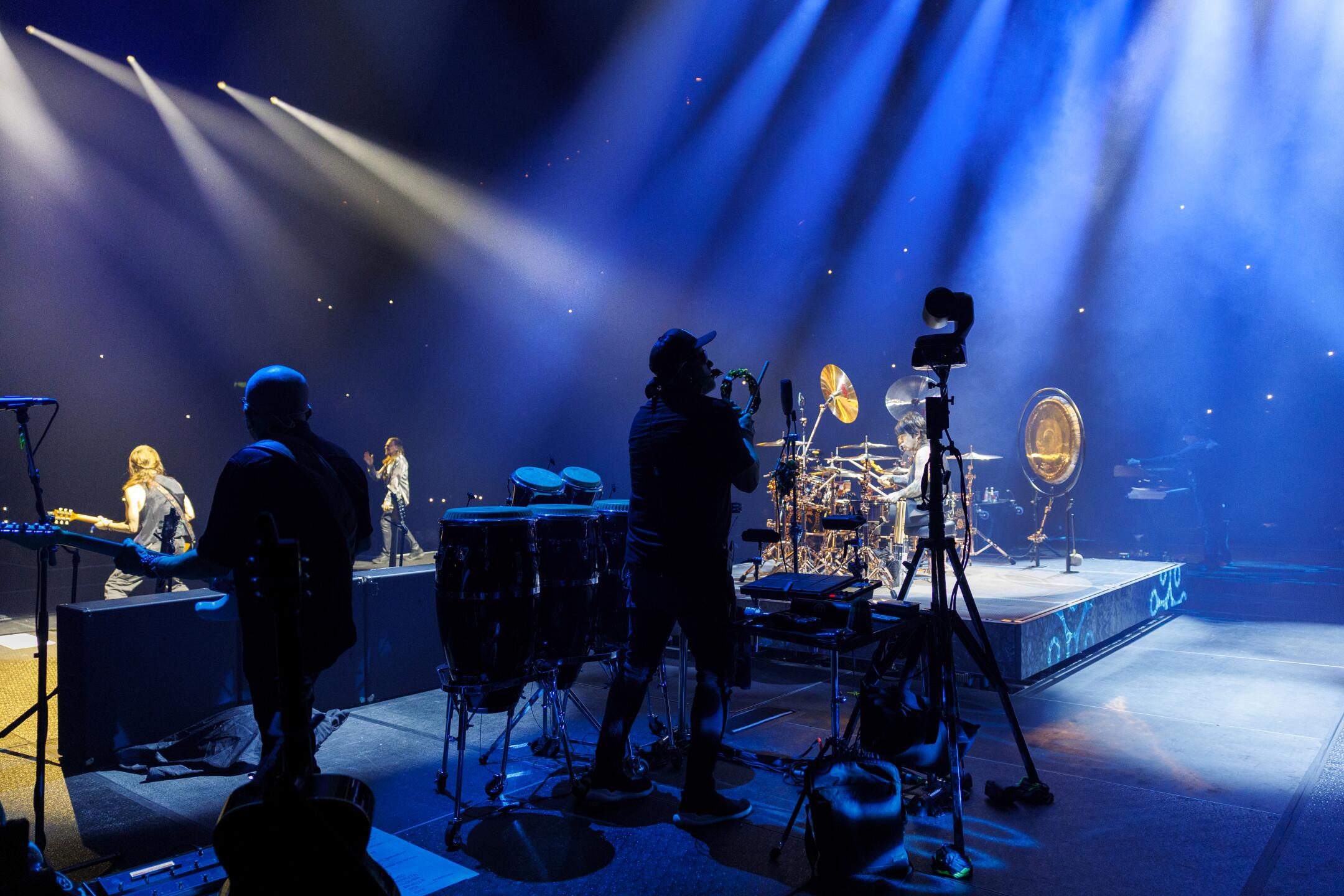
Maná’s concert at the Kia Forum on Friday night began with a grand entrance: they were greeted by performances from the USC Marching Band, the Inglewood High School band, and the Los Angeles Clippers Spirit Team.
The band’s concert that night was their 43rd arena show in the Los Angeles area, breaking Bruce Springsteen’s record for the most arena shows ever performed there.

Rock en español flourished in Southern California, creating a lively “Rock Angelino” scene that united Latin American immigrants with U.S.-born Latinos from various generations.
To celebrate Maná’s deep connection to Los Angeles and the iconic Forum, a permanent art installation was unveiled backstage after their grand entrance. The installation simply states: “Maná – Kings of L.A.”
The Grammy-winning group has performed at the Forum over 30 times. They also famously played eleven sold-out shows in a row at Staples Center in 2012 while promoting their eighth album, “Drama Y Luz.”

Further tying them to L.A. is their star on the Hollywood Walk of Fame, which was cemented in 2016.
Maná started in Guadalajara, Mexico, in the mid-1980s and first performed in Los Angeles in 1993 after releasing their popular album, “¿Dónde Jugarán los Niños?” in 1992. They played a huge role in making Spanish-language rock music popular, and their songs are frequently heard throughout Southern California, at everything from casual gatherings to big events.
The Rock & Roll Hall of Fame revealed earlier this year that the group is a nominee for induction in 2025, joining artists like Oasis, Mariah Carey, Outkast, and Cyndi Lauper on the list.

Column: Why the Rock Hall Needs to Induct Maná
This famous Spanish-language rock band is set to make history as the first act performing primarily in Spanish to be inducted, and that feels especially significant given the current political climate in the United States.
Despite not being chosen for the Rock Hall this year, the band made history as the first group performing mainly in Spanish to be nominated.
In February, contributing columnist Alex Zaragoza explained that Maná’s nomination is particularly significant given our increasingly global world. She added that considering the band’s influence on Latin music, and the stricter immigration policies enacted by the Trump administration at the time, their inclusion was essential.
Following large protests in Los Angeles against President Trump’s policies, the Los Angeles Kings hockey team expressed support for residents impacted by the administration’s recent actions. Many Kings players consider Los Angeles their second home, and wanted to show solidarity with the community.

I’ve always been struck by how much Los Angeles has inspired Maná. Fher Olvera recently shared with The Times that they’ve watched the city change over the years, and it’s amazing to see the growing influence of the Latino community. But he also pointed out that alongside that progress, the challenges facing the community have unfortunately gotten bigger, particularly recently. It’s a complex picture, and it really resonated with me to hear him acknowledge both sides of that story.
After ICE conducted raids in Los Angeles in June, the band Maná publicly criticized the actions and emphasized the significant contributions of immigrants and Latinos to the United States.
Olvera urged people to stay hopeful and not lose heart. He quoted the Buddhist saying, ‘Everything shall pass,’ and applied it to the current challenges, expressing confidence that they won’t last forever. He noted that presidential terms are limited, even though this one has felt exceptionally long and difficult.
Olvera is hopeful about the future for Latinos in the United States, noting the increasing influence of Latino voters.
He believes the growing influence of Latino voters will continue to shape elections in the future. He acknowledged this shift worries some politicians, but stated it’s a permanent trend.

Music
Ahead of their eight-night run at the Forum, Maná’s Fher Olvera and Sergio Vallín spoke with The Times about how Los Angeles’ vibrant Latino community fuels their creativity.
Drummer Alex Gonzalez said that his concerts haven’t experienced problems with Immigration and Customs Enforcement (ICE) since the beginning of Donald Trump’s second term. He also encouraged Latinos across the country to be aware of and exercise their legal rights.
The band expressed this feeling more fully when they ended their Friday performance with a shorter version of Bob Marley’s classic song, “Get Up, Stand Up.”
After giving a powerful speech about the Latino community to a full stadium, Olvera sang, “Get up, stand up / Stand up for your right / Get up, stand up / Don’t give up the fight.”
Guitarist Sergio Vallín told The Times that he believes it’s crucial to use their platform to raise awareness about environmental issues and human rights. He also said they aim to be a positive influence for their fans.

Even from the beginning of their career, the group has used their music to address important social issues. Songs like “Falta Amor,” “Me Voy a Convertir en Un Ave,” and “Justicia, Tierra y Libertad,” as well as their rendition of Rubén Blades’ “Desapariciones,” highlight these themes, with the latter specifically focusing on the disappearances of citizens under Latin American dictatorships.
In 1996, the band Maná created the Selva Negra Foundation, inspired by one of their songs, to protect endangered species, rebuild damaged ecosystems, and teach people about the environment. They’re also strong advocates for Mexico’s sea turtles, often highlighting them in their concert visuals.
Friday night wasn’t just a concert; it was a chance for families to share their love of Maná with new generations and connect with others through the band’s music.
Maritza Castillo, a 48-year-old originally from San Miguel el Alto, Mexico, was at the concert celebrating her birthday with her family – her husband, two children, and in-laws. She first became a fan of the band Maná when she was sixteen years old.
Castillo shared that Maná holds a special place in their heart, reminding them of their younger years and being the band they first saw live in the U.S. What’s even more meaningful is that their son has started listening to Maná on his own. ‘It’s amazing to hear him play their music in the car without me even suggesting it,’ Castillo said, ‘It shows how the band’s music is connecting with a new generation, which is really exciting.’
Since Maná also comes from Jalisco, Mexico, Castillo is happy her children are learning about their family history through the band’s music.
“I just keep trying to pass on our culture to the kids who are grown up and born in L.A.”
Read More
- Clash Royale Best Boss Bandit Champion decks
- Vampire’s Fall 2 redeem codes and how to use them (June 2025)
- M7 Pass Event Guide: All you need to know
- Clash Royale Furnace Evolution best decks guide
- Mobile Legends January 2026 Leaks: Upcoming new skins, heroes, events and more
- Clash of Clans January 2026: List of Weekly Events, Challenges, and Rewards
- Best Arena 9 Decks in Clast Royale
- Brawl Stars Steampunk Brawl Pass brings Steampunk Stu and Steampunk Gale skins, along with chromas
- How “Hey Grok” turned X’s AI into a sexualized free-for-all
- World Eternal Online promo codes and how to use them (September 2025)
2025-11-25 21:02